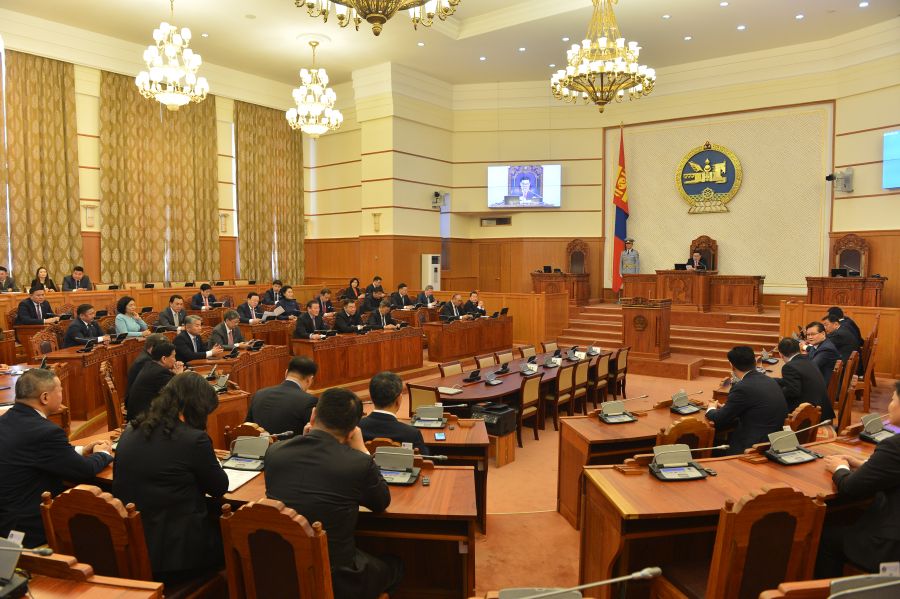ID :
526726
Fri, 03/22/2019 - 07:33
Auther :
Shortlink :
http://m.oananews.org//node/526726
The shortlink copeid
Package of tax bills to be passed during Irregular Session of the Parliament

Ulaanbaatar /MONTSAME/. The package of revised tax bills is the main agenda to be considered during the Irregular Session of the Parliament, opened on March 18.
The package involves revised bills on General Taxation, Personnel Income Tax and Corporate Income Tax. On May 29, 2018, the Government submitted to the Parliament these bills which were formulated with a purpose to resolve tax disputes arising between taxpayer and taxation administration, introduce international standards and innovative taxation principles into Mongolia in harmony with the country’s conditions, promote investors and broaden the taxation base. At its plenary meeting dated June 18, 2018, the Parliament backed to bring the package bills into discussion.
Since then, a working group, responsible for preparing the package for discussions, had worked to improve the bills and consequently organized a discussion ‘Presentation of the package of tax bills’ on February 18 with an aim to introduce and reflect proposals of individuals and businesses. The package of tax bills is intended to be discussed and passed as priority during the irregular session; thus the matter was listed on the top of agenda to be discussed by Standing Committees and plenary meeting of the parliament.
FINANCE MINISTER CH.KHURELBAATAR: PACKAGE OF REVISED TAX BILLS CREATES A PLEASANT ENVIRONMENT FOR DOMESTIC AND FOREIGN INVESTORS
Minister of Finance Ch.Khurelbaatar reported that the package of revised tax bills targets to create a favorable environment for domestic and foreign investors as well as lower some tax taxes.
The Minister describes the package of revised tax bills--the main topics in the agenda of the irregular session, which opened on March 18:
1. Corporate income tax of 25 percent to be applied to entities with income exceeding 6 billion, which was previously 3 billion. /As a result, entities will have further growth and foreign investors will have reduced tax rate./
2. In aims of increasing investment and reducing the costs of entities for foreign-source income, the tax on dividend and interest income is to be reduced to 5 percent when the company trades its stake or bond at domestic or international stock exchanges /This is to increase foreign investment/
3. In aims of supporting the operations of SMEs, reducing their costs in taxes and making it easier to report, simplified tax payment procedure has been reflected in the bill, which includes the following:
-Entities with sales income of up to MNT 50 million have the option to pay tax equal to 1 percent of income and submit tax report once a year
-Entities with annual taxable income of less than MNT 1.5 billion to have 90 percent tax exemption and submit tax report twice a year
4. In aims of supporting the operations and export of entities located in Mongolia, the tax paid in other countries, which Mongolia has the legal framework to exchange tax information, shall be deductible expenses from taxable income to prevent double taxation.
5. To meet international standards, time periods for calculating depreciation for building and construction will be reduced to 25 years which is 40 years in the existing law. /With the changes in effect, the rate of return will be increased/
6. Taxpayer will be allowed to correct tax return in the following year. Changing the length of time to pay tax liabilities from 60 days to 2 years will reduce tax costs and support businesses to make profit.
7.By changing tax inspection to be done only for risky taxpayers which will be determined by risk assessment, instead of all taxpayers, it will reduce stress on entities.
Furthermore, we aim to create condition for domestic and foreign entities to have fair competition by adding the new principles of international taxation to the bill. This includes:
a) Mongolia to exchange information with other countries for tax purposes /Global Forum/:
With Mongolia being included in the first ever EU list of non-cooperative jurisdictions for tax purposes in 2017, negative impact would have been done to the investment environment. Thus, on December 26, 2017, Mongolia joined the Global Forum on Transparency and Exchange of Information for Tax Purposes. By joining the forum, it creates the opportunity to partner with other countries by exchanging information for tax purposes. To ensure the implementation, the requirements of the forum on exchange of information, transparency and information security were included in the bill.
b) Measures against tax avoidance to be renewed /BEPS/:
“From what can be seen from other countries’ experiences, multinational corporations are seeking various ways to avoid tax payments. Countries around the world are also making amendments to their laws to take measures against tax avoidance in order to protect their tax base. As it is necessary to fully collect taxes and protect the tax base, the aforementioned changes have also been made for the bill.
By introducing the international tax principles, reinforcement of fair competition and the regulation against tax avoidance will be further enhanced, creating the opportunity for Mongolia to implement international treaties and agreements. As a result, a fair and transparent tax environment will be created in the mid- and long-term, which will set the conditions to attract investment, support operations of businesses and broaden the tax base.
Eliminating loopholes by making changes to ambiguous regulations and making the law mutually transparent and easier to implement for both the taxation office and taxpayers will erase the difficulties on the implementation level,” explained the Minister.
In his speech at the opening of the irregular session of the parliament on March 18, Speaker G.Zandanshatar said, “With the approval of the revised bill on taxes, the balance of rights and duties of the taxpayers and the taxation office will be provided, and the tax burden on entities and citizens as well as tax avoidance will be reduced, increasing income by broadening the tax base.”





